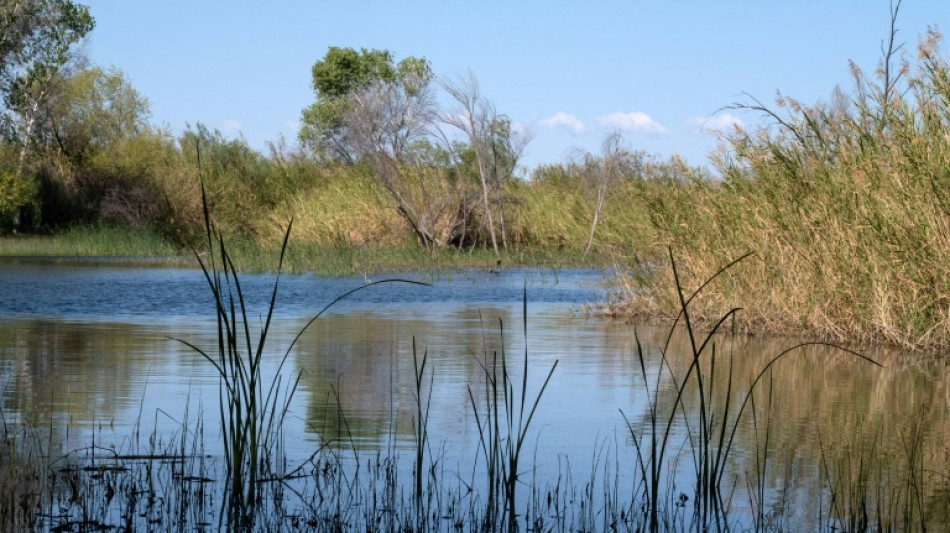
-
 Myanmar pro-military party claims Suu Kyi's seat in junta-run poll
Myanmar pro-military party claims Suu Kyi's seat in junta-run poll
-
Fed chair Powell says targeted by federal probe

-
 Trailblazing Milos Raonic retires from tennis
Trailblazing Milos Raonic retires from tennis
-
Australia recalls parliament early to pass hate speech, gun laws

-
 'One Battle After Another,' 'Hamnet' triumph at Golden Globes
'One Battle After Another,' 'Hamnet' triumph at Golden Globes
-
Japan aims to dig deep-sea rare earths to reduce China dependence

-
 Top UN court to hear Rohingya genocide case against Myanmar
Top UN court to hear Rohingya genocide case against Myanmar
-
US sends more agents to Minneapolis despite furor over woman's killing

-
 Trump says Iran 'want to negotiate' after reports of hundreds killed in protests
Trump says Iran 'want to negotiate' after reports of hundreds killed in protests
-
Bangladesh's powerful Islamists prepare for elections

-
 NBA-best Thunder beat the Heat as T-Wolves edge Spurs
NBA-best Thunder beat the Heat as T-Wolves edge Spurs
-
Ukraine's Kostyuk defends 'conscious choice' to speak out about war

-
 Trump says working well with Venezuela's new leaders, open to meeting
Trump says working well with Venezuela's new leaders, open to meeting
-
Asian equities edge up, dollar slides as US Fed Reserve subpoenaed

-
 Hong Kong court hears sentencing arguments for Jimmy Lai
Hong Kong court hears sentencing arguments for Jimmy Lai
-
Powell says Federal Reserve subpoenaed by US Justice Department

-
 Chalamet, 'One Battle' among winners at Golden Globes
Chalamet, 'One Battle' among winners at Golden Globes
-
Turning point? Canada's tumultuous relationship with China

-
 Eagles stunned by depleted 49ers, Allen leads Bills fightback
Eagles stunned by depleted 49ers, Allen leads Bills fightback
-
Globes red carpet: chic black, naked dresses and a bit of politics

-
 Maduro's fall raises Venezuelans' hopes for economic bounty
Maduro's fall raises Venezuelans' hopes for economic bounty
-
Golden Globes kick off with 'One Battle' among favorites

-
 Australian Open 'underdog' Medvedev says he will be hard to beat
Australian Open 'underdog' Medvedev says he will be hard to beat
-
In-form Bencic back in top 10 for first time since having baby

-
 Swiatek insists 'everything is fine' after back-to-back defeats
Swiatek insists 'everything is fine' after back-to-back defeats
-
Wildfires spread to 15,000 hectares in Argentine Patagonia

-
 Napoli stay in touch with leaders Inter thanks to talisman McTominay
Napoli stay in touch with leaders Inter thanks to talisman McTominay
-
Meta urges Australia to change teen social media ban

-
 Venezuelans await political prisoners' release after government vow
Venezuelans await political prisoners' release after government vow
-
Lens continue winning streak, Endrick opens Lyon account in French Cup

-
 McTominay double gives Napoli precious point at Serie A leaders Inter
McTominay double gives Napoli precious point at Serie A leaders Inter
-
Trump admin sends more agents to Minneapolis despite furor over woman's killing

-
 Allen magic leads Bills past Jaguars in playoff thriller
Allen magic leads Bills past Jaguars in playoff thriller
-
Barca edge Real Madrid in thrilling Spanish Super Cup final

-
 Malinin spearheads US Olympic figure skating challenge
Malinin spearheads US Olympic figure skating challenge
-
Malinin spearheads US figure Olympic figure skating challenge

-
 Iran rights group warns of 'mass killing', govt calls counter-protests
Iran rights group warns of 'mass killing', govt calls counter-protests
-
'Fragile' Man Utd hit new low with FA Cup exit

-
 Iran rights group warns of 'mass killing' of protesters
Iran rights group warns of 'mass killing' of protesters
-
Demonstrators in London, Paris, Istanbul back Iran protests

-
 Olise sparkles as Bayern fire eight past Wolfsburg
Olise sparkles as Bayern fire eight past Wolfsburg
-
Man Utd knocked out of FA Cup by Brighton, Martinelli hits hat-trick for Arsenal

-
 Troubled Man Utd crash out of FA Cup against Brighton
Troubled Man Utd crash out of FA Cup against Brighton
-
Danish PM says Greenland showdown at 'decisive moment' after new Trump threats

-
 AC Milan snatch late draw at Fiorentina as title rivals Inter face Napoli
AC Milan snatch late draw at Fiorentina as title rivals Inter face Napoli
-
Venezuelans demand political prisoners' release, Maduro 'doing well'

-
 'Avatar: Fire and Ashe' leads in N.America for fourth week
'Avatar: Fire and Ashe' leads in N.America for fourth week
-
Bordeaux-Begles rout Northampton in Champions Cup final rematch

-
 NHL players will compete at Olympics, says international ice hockey chief
NHL players will compete at Olympics, says international ice hockey chief
-
Kohli surpasses Sangakkara as second-highest scorer in international cricket


Once-dying Mexican river delta slowly nursed back to life
In a drought-hit Mexican border region at the center of growing competition with the United States for water, conservationists are working to bring a once-dying river delta back to life.
On a stretch of the Colorado River, which on the Mexican side of the frontier is mostly a dry riverbed, native cottonwood and willow trees have been planted in place of invasive shrubs.
It is the fruit of two decades of work by environmentalists along the lower part of the river from the US-Mexican border to the upper estuary of the Gulf of California, also known as the Sea of Cortez.
"If we give a little water and care to certain sections of the river, we can recover environments that had already been completely lost," said Enrique Villegas, director of the Colorado River Delta program at the Sonoran Institute, a US-Mexican civil society group.
The Colorado starts in the Rocky Mountains and winds its way through the southwestern United States, feeding cities and farmland along the way.
By the time it crosses into Mexico most of its water has already been consumed.
What is left is diverted to supply border cities like Tijuana and to irrigate agricultural land.
It means Tijuana and nearby areas are at the mercy of how much snow falls in the Rockies, said Marco Antonio Samaniego, an expert at the Autonomous University of Baja California.
"We don't live off what rains in Tijuana. We live off what snows in those mountains," he said, adding that several years of below-average precipitation had reduced reservoir levels in the United States.
Growing competition for resources sparked a recent diplomatic row when the United States refused Mexico's request for water due to shortfalls in sharing by its southern neighbor under a decades-old treaty.
"The basis of all the problems," Villegas said, is that "there is more water distributed among all the users of the Colorado River than actually exists."
- Wildlife returns -
Over the years, dams and diversions reduced the river to a trickle and turned a delta that once teemed with birds and other wildlife into a dying ecosystem.
So conservationists secured land as well as irrigation permits, cleared invasive shrubs and planted thousands of native trees.
In 2014, water was allowed to surge down the Colorado River through a dam at the border for the first time in years to encourage the natural germination of native species.
"After years of this type of work, we now have a forest of poplars and willows on 260 hectares (642 acres) on a stretch of the Colorado River. Fauna has returned. Many birds have returned," Villegas said.
The rejuvenation has also brought back another native -- the beaver -- a species that had largely disappeared from sight in the area, Villegas said.
"On the one hand, it's a biological indicator that if you give nature a habitat then it returns and begins to reproduce. But they're also knocking down trees that we planted," he said.
At Laguna Grande, a lush oasis surrounded by dusty fields that is a centerpiece of the restoration project, coots and other birds swim contentedly in wetlands while herons startled by visitors clumsily take flight.
Nearby, on land, underground hoses feed water to trees sprouting from the dusty ground.
The Colorado River Delta is an important rest point for migratory birds including the yellow-breasted chat, vermilion flycatcher and endangered yellow-billed cuckoo, according to conservationists.
The wetlands and forest of Laguna Grande contrast starkly with parched agricultural land nearby where farmers such as Cayetano Cisneros are facing increasingly tough conditions.
"Years ago, we sowed maize, we sowed cotton, we sowed everything, and we didn't suffer because of water," the 72-year-old said on his dusty ranch.
These days, "the Colorado River no longer carries water," he said. "The environment is changing a lot."
If more of the delta and other such areas are to be nursed back to health, people must change their use of water, conservationists note.
"We can all improve our awareness of water consumption," Villegas said.
"This drought is just a warning."
N.Awad--SF-PST



